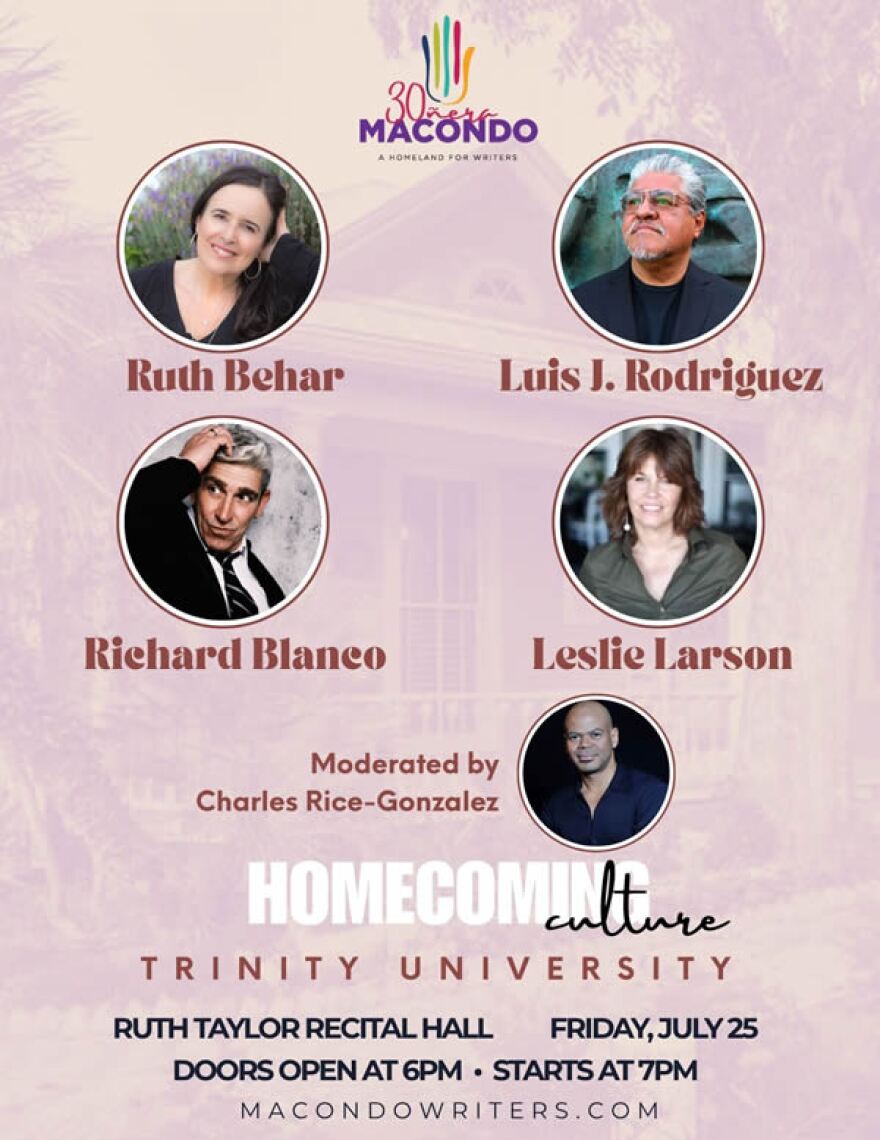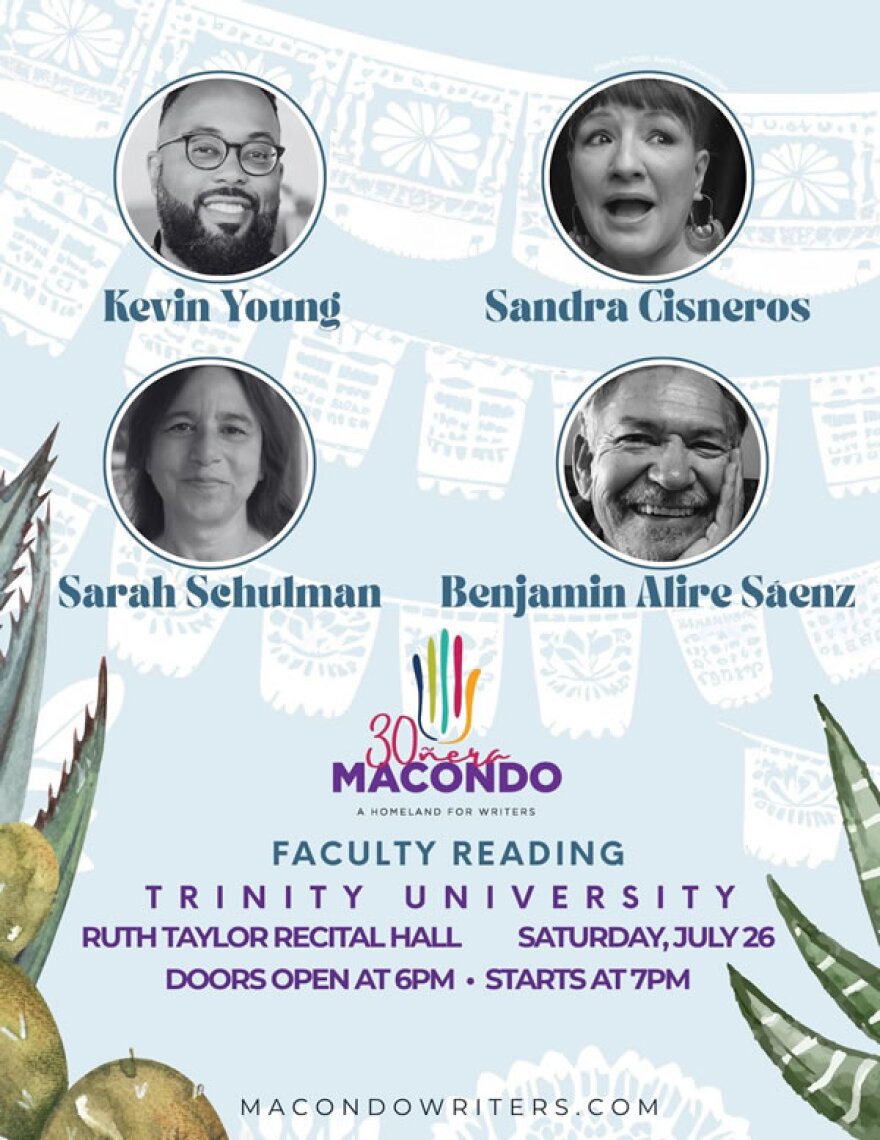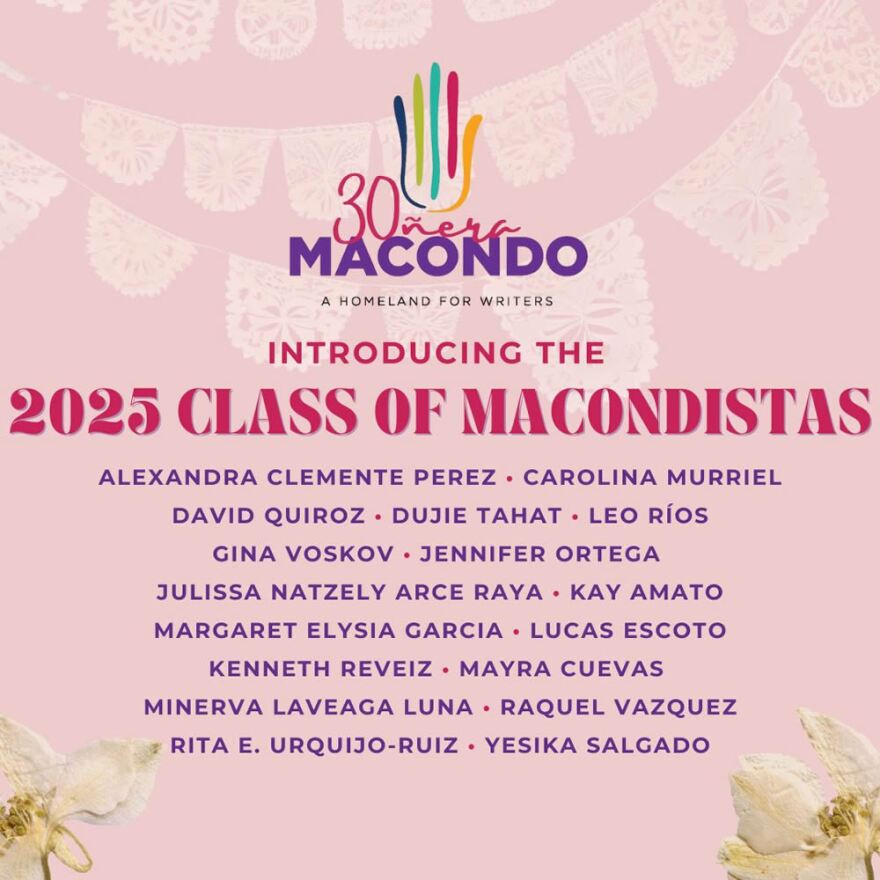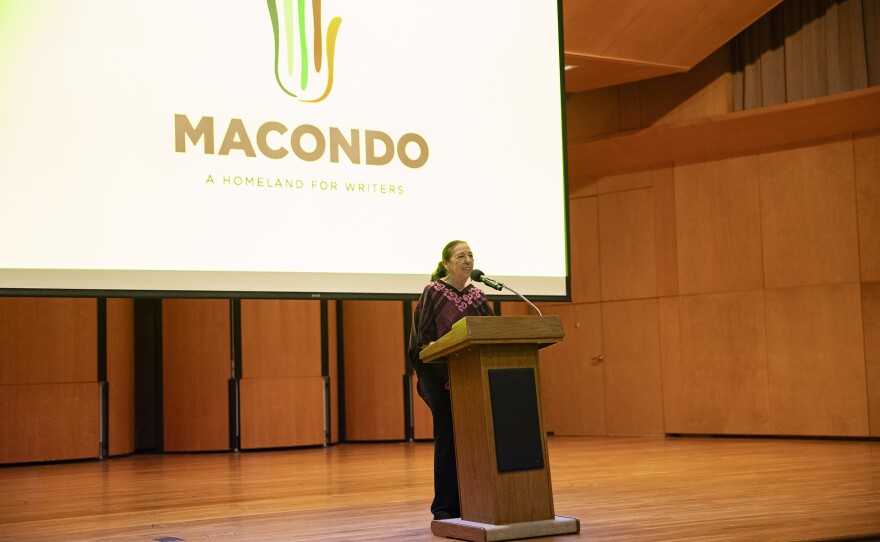Sign up for TPR Today, Texas Public Radio's newsletter that brings our top stories to your inbox each morning.
Renowned writers from across the country are gathering in San Antonio next week for the Macondo Writers Workshop, which was started 30 years ago by famed Chicana writer Sandra Cisneros.
Macondo is considered a homeland for writers. It takes its name from the mythical village in Gabriel García Márquez’s One Hundred Years of Solitude.
Macondo consists of a carefully-curated group of writers, “Macondistas,” active in social justice causes. They participate in in-depth workshops with a group of invited faculty.
The workshops and a number of free public events are taking place from July 21 to July 27 at Trinity University and at the headquarters of TPR.
TPR's Norma Martinez spoke with María-Luisa Ornelas-June, an independent scholar who focuses on Tejano folklore. She is a relative newcomer to Macondo, having participated in her first workshop in 2023.
She also spoke with Norma Elia Cantú, a writer, poet, folklorist, and the Murchison Professor of the Humanities at Trinity University. She has been with Macondo from the start.
Cantú began the conversation by saying that Sandra Cisneros wanted a different kind of workshop — one that was intimate, fruitful, and compassionate.
This conversation has been edited for clarity and length.

Cantú: It was Sandra inviting particular writers who wanted to come together to have a different kind of workshop experience. The traditional workshop, if you will, is not necessarily the model that many of us who work in social justice appreciate or would be part of. So, it's a little different from that.
And the concept is that you come together for a week, más o menos, and you write. You write in workshops, or you write as a Chuparosa. Chuparosas are former Macondistas, people who have done the workshop, who come back, not necessarily to be in a workshop, but just to write together alone.
Martinez: María-Luisa, I know that the Macondo experience, being so unique, you are relatively new to it. So, what was it that particularly drew you to it in the very beginning?
Ornelas-June: A couple of things. One is because I'm a Tejana folklorist, writing in this landscape, in our land, is really very generative for me. So, it was really nice to find a workshop that was being held in San Antonio.
And then when I sort of researched it a little bit more, to find that we have to abide by stuff like the Code of Compassionate Conduct. It's really nice to think that people are there to support you and to encourage the writing and the growth, because sometimes it can be quite competitive when you're in other writing spaces, and we have very unique stories that are usually very full of social activism. And in other spaces, those voices can either be misunderstood or silenced, and this is not a place where that occurs.
Macondo gave me sort of the support that I need, because I'm starting late in life, and it's kind of important to have a community that recognizes you as a writer. And I think I carry sort of the double burden of both being a woman and being a Tejana, and the literary scene is not necessarily very welcoming, but Macondo is like, “We got you.”
TPR’s journalism is free to read, but not free to produce. If you believe in independent, local journalism, help us keep it going.
Martinez: And the nice thing I think about this workshop is it's not a bunch of writers gathering together in rooms where they're just going to be huddled together writing. There are community events tied to this week of writing workshops. María-Luisa, I'm wondering which is the one you're most looking forward to?
Ornelas-June: I always like listening to readings. And we've got two readings going on. We have readings one night by Macondistas. This is on Wednesday night, and then we've got a faculty reading on Friday night.
And when you go, it's like having a botana of literary snippets. Some may be poetry, some may be fiction, nonfiction, it can be a combo. And so, it's really nice, and you don't know where the stories are going to come from.
So, it's a nice, beautiful, unexpected variety. I like the surprise. And they're short, and you get a lot in the time allotted for the reading. So, the readings are my favorite.

Cantú: I think there's like 15 readers, right? In an hour and a half.
Yeah, normally we would have seminars, so it's an invited luminary, or somebody who has a skill or something to share. And we do those seminars in the morning. The workshops are held in the afternoon.
This year, because it is our 30th anniversary, we decided to do something different. We're calling it Homecoming tables or panels, and we have three. The first one is going to actually be held here at Texas Public Radio, and it's the one that focuses on community. And the participants are Sandra Cisneros — our founder — Rigoberto González, Martín Espada, John Phillips Santos, Sharon Bridgforth. And the moderator is a local, Xelena González.

There are two other Homeland panels. That one I just talked about was Thursday. This next one is on Friday, and that one is focused on culture. Ruth Behar, a nationally known children's book writer and young adult [author], is a professor at the University of Michigan. She will be on that panel.
Richard Blanco was the inauguration poet for Barack Obama, and he has been with Macondo, I think, for about 20 or 30 years, actually. He has functioned as a Macondista, as a seminar leader, as faculty. A couple of years ago, he taught the poetry workshop, and he's coming back to participate in one of these public Homeland panels at Trinity University in the Ruth Taylor Hall.
Two other writers who are going to be with Richard are Leslie Larson from California, and she also has a long history with Macondo, and Luis Rodriguez, who, again, has come several times for faculty and to be a seminar leader. Luis is a really special community-grounded writer who lives in California, in Los Angeles, but has an international following. I was with him in Cuba, where we went to a festival. He is a poet, but he also writes a memoir, autobiography — really powerful.

Martinez: Well, I know there's a faculty reading on Saturday, July 26, and these are the four faculty who will be leading these workshops for the Macondo Writers Workshop. And I'm wondering if you can maybe tell us a little bit about those workshops and who will be featured.
Cantú: Every year we have four workshops focused on different genres: poetry, fiction, nonfiction and a multi-genre. This year, the multi-genre one is going to be led by Pulitzer Prize winning Cristina Rivera Garza.
And the poetry one is going to be Kevin Young, who is amazing. Kevin is an African American poet from coming in from [Washington, D.C.], where he was, until very recently, director of the Smithsonian Museum for African American History.
Benjamin Alire Sáenz is doing the fiction workshop. Benjamin is a poet as well. And Benjamin comes from El Paso. He's a retired professor from [the University of Texas at El Paso. He] has many, many students in the state who went through the MFA program there.
Sarah Schulman is a poet, novelist, nonfiction [writer] from New York, and she's going to be leading the nonfiction workshop.

Martinez: And so the faculty reading is going to be Saturday, July 26, at 7 p.m. Is that going to be sort of the cherry on top of the whole festival?
Cantú: It always is, como para cerrar con broche de oro (closing with a flourish). We have the faculty read, and then there's a pachanga where we close it up with a party for our participants.

Martinez: And so Maria-Luisa, as a board member, you know people might be listening to this thinking that this is just for writers only to attend, even with these public events. What can you say to maybe encourage people who are hearing about these really incredible writers all gathered here in San Antonio for one week, and in many instances in one panel event? What can you say to maybe encourage people to turn out to a lot of these events and meet some of these really wonderful writers?
Ornelas-June: When we have the Macondista reading, a lot of the Macondistas are also nationally known writers. They just aren't faculty this year — they have served as faculty before. And so, some people may have a favorite author that is actually going to be in town as a Macondista, because they're taking a workshop, or they're here as a chuparosa. And the Macondista reading is a perfect time for them to approach their author. If they want to talk to them, meet them, have them sign a book, because at these events, we have books for sale from these Macondistas.
Then with the faculty, it's the same thing. They're approachable afterwards. We've got their books available, and they're there for signings.
One thing I will note is that Cristina Rivera Garza was not able to stay for the faculty reading this year, but Sandra Cisneros is reading at the faculty reading.
Martinez: Not a bad replacement.
Ornelas-June: No, no. It would be best if we had both. But you can't always get everything you want. It's a little greedy.
Cantú: And by the way, let me talk about the name, because Macondo, when Sandra started it in 1995, the idea is that it is kind of a García Márquez space — not your normal everyday happenings. And also, the connection to the literary heritage of Latin America.
Pero también, I think for Sandra, the focus and the main thing was that it be open to anybody — not just Latinos and Latinas — and that it also has a focus on social justice. So, the people who apply self-select already, because on the application, you have to submit proof that you have engaged social justice in your work.

Martinez: Well, Norma Elia Cantú and María-Luisa Ornelas-June, a pleasure to have you both talking to us about Macondo this year.
Ornelas-June: Thank you for having us.
Cantú: Thank you, yes, it’s been a real pleasure.








